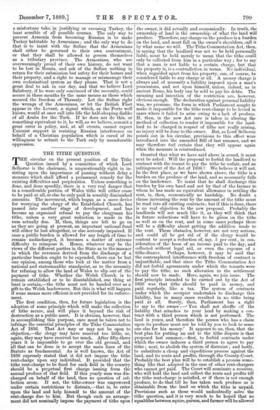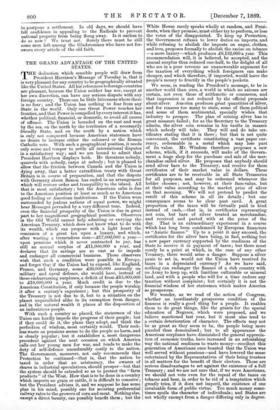THE TITHE QUESTION. T HE cirenlar on the present position of
the Tithe Question issued by a committee of which Lord Selborne is the chairman, is unquestionably right in in- sisting upon the importance of passing without delay a measure which shall afford a permanent remedy for the existing difficulties and perplexities. Unless something is done, and done speedily, there is a very real danger that in a considerable portion of Wales tithe will either cease to be paid at all, or else be only paid in sensibly diminished amounts. The movement, which began as a mere device for worrying the clergy of the Established Church, has passed into another stage of development, and has become an organised refusal to pay the clergyman his tithe, unless a very great reduction is made in the sum actually due. If, then, things are left to go on as they are going at present, an important national fund will either be lost altogether, or else seriously impaired. If once a public burden is allowed for any length of time to remain undischarged, it becomes a matter of extreme difficulty to reimpose it. Hence, whatever may be the views of the different parties in the State as to the manner in which the revenues derived from the discharge of a particular burden ought to be expended, there can be but one opinion, among those who look at the matter from a national and statesmanlike standpoint, as to the necessity for refusing to allow the land of Wales to slip out of the payment of tithe. Whether the Welsh Church is to remain established or to be disestablished, one thing at least is certain,—the tithe must not be handed over as a gift to the Welsh landowners. But this is what will happen if some means more efficient is not provided for its enforce- ment.
The first condition, then, for future legislation is the adoption of some principle which will make the collection of tithe secure, and will place it beyond the risk of destruction as a public asset. It is obvious, however, that in accomplishing this purpose, care must be taken not to infringe the essential principles of the Tithe Commutation Act of 1836. That Act may or may not be open to objection,—the clergy may have received too little, or, again, they may have received too much. After fifty-three years it is impossible to go over the old ground, and all that can be done is to accept the main lines of the Statute as fundamental. As is well known, the Act of 1836 expressly stated that it did not impose the tithe rent-charge upon any individual, It provided that the tithe rent-charge to be fixed for each field in the country should be a perpetual first charge issuing from the annual produce of that field. If this yearly sum was dis- charged on behalf of the land, then no question of col- lection arose. If not, the tithe-owner was empowered under certain restrictions to distrain,—that is, to enter upon the land and help himself to the amount of the rent-charge due to him. But though such an arrange- ment did not nominally impose the payment of tithe upon the owner, it did actually and economically. In truth, the ownership of land is the ownership of what the land will produce. Therefore, any charge on the produce is a burden on the land, and must fall on the owner's shoulders, call it by what name we will. The Tithe Commutation Act, then, in saying that the landlord was not to be held personally liable, must be held merely to mean that the tithe could only be collected from him in a particular way ; for to say that a man is not liable to a certain charge, but that his property is, is a contradiction in terms. No individual, when regarded apart from his property, can, of course, be considered liable to any charge at all. A money charge is always and of necessity a liability imposed upon a man's possessions, and not upon himself, unless, indeed, as in ancient Rome, his body can be sold to pay his debts. The meaning and intention of the restriction are, however, obvious enough. The declaration against personal liability was, we presume, the form in which Parliament sought to make it impossible for the tithe rent-charge to be levied in cases where it failed to arise owing to a lack of produce. If, then, in the new Act care is taken in altering the method of collection to render it impossible for the land- lord to be charged in respect of tithe not really arising, no injury will be done to the owner. But, as Lord Selborne points out in his circular, provisions to this effect were introduced into the amended Bill of last summer, and we may therefore feel certain that they will appear again when the measure is reintroduced.
Granted that what we have said above is sound, it must next be asked : Will the proposal to forbid the landlord to contract with the tenant to pay the tithe be unfair, and an infringement of the Act of 1836 ? We believe it will not. In the first place, as we have shown above, the tithe is a burden on the produce of the land, and so necessarily falls on the landowner. To insist that he shall discharge this burden by his own hand and not by that of the farmer to whom he has made an equivalent allowance in settling the rent, is, then, economically no hardship. No doubt a clause increasing the rent by the amount of the tithe must be read into all existing contracts ; but if this is done, there is no real objection to the new proposal. Probably the landlords will not much like it, as they will think that in future reductions will have to be given on the tithe as well as on the rent, and in some cases perhaps there will be a difficulty about getting the addition made to the rent. These obstacles, however, are not very serious, and could all be got rid of if the clergy would be content to accept a reduction of, say, 5 per cent., in con- sideration of the boon of an income paid to the day, and collected without legal aid, or even the expense of a tithe-dinner. Perhaps, however, it may be said that the contemplated interference with freedom of contract is unjustifiable, and that since the Tithe Commutation Act did not forbid agreements under which the tenants were to pay the tithe, no such alteration in the settlement should now be made. Here, again, we join issue. The first principle intended to be carried out by the Act of 1836 was that tithe should be paid in money, and paid regularly, like a tax. The system of contracts under which the occupier undertakes to discharge this liability, has in many cases resulted in no tithe being paid at all. Surely, then, Parliament has a right to say to the owner :—' You shall not shuffle off the liability that attaches to your land by making a con- tract with a third person which is not performed. The land is yours, and therefore the person who has a claim upon its produce must not be told by you to look to some one else for his money.' It appears to us, then, that the best plan for putting an end to the tithe dispute is that proposed last summer,—first, to forbid contracts under which the owner induces a third person to agree to pay tithe ; next, to abolish the system of distraint ; and lastly, to substitute a cheap and expeditious process against the land, and its rents and profits, through the County-Court.
Probably the best plan will be to establish a process some- thing like that adopted in the case of other rent-chargers who cannot get paid. The Court will nominate a receiver, who will hold the land and collect the rents and profits till the tithe rent-charge is satisfied, or if there is not enough produce, to do that till he has taken such produce as is obtainable from the land on which the tithe is unpaid. Provisions such as these would undoubtedly solve the tithe question, and it is very much to be hoped that no squabbles between squire, parson, and farmer will be allowed to postpone a settlement. In old days, we should have felt confidence in appealing to the Radicals to prevent national property from being flung away. Is it useless to do so now ? We trust not. Surely there must be still some men left among the Gladstonians who have not for- sworn every article of the old faith.























































 Previous page
Previous page